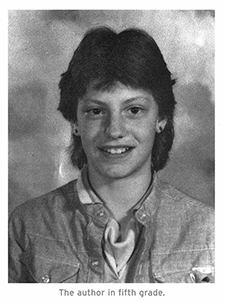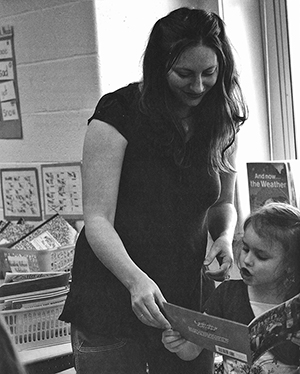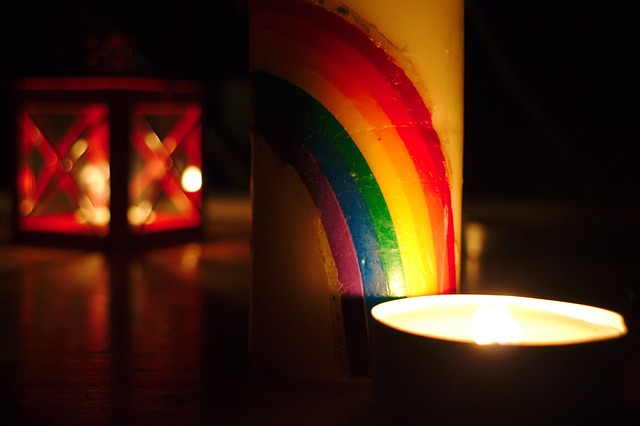Originally published in Teachers & Writers Magazine (Spring 2008, Volume 39, Number 3).
I was in fifth grade when I was introduced to the avant-garde. It was my first experience of e.e. cummings and it was brought to me by Teachers & Writers Collaborative in my classroom at Hilltop Middle School in Nyack, New York. Poet Harry Greenberg was doing a residency in Mrs. Mitchell’s English class, and my classmates and I were thrilled. Thrilled just to have something different come to us in our New York public school, in the bleakness of winter. Any time a guest came to the class the dynamic changed. Novelty is memorable; it makes an impression and inspires a more acute attention. Harry Greenberg was a visitor who brought a new take on familiar vocabulary to us. Though we all knew what poetry was, and alliteration, and repetition, and a great many other things, Harry Greenberg had a different way of presenting poetic concepts to us because his passion was palpable. His brown curly hair and ’70s style invited us into the world of poetry directly through the door of his experience; he was a poet first and foremost. Our teacher was also clearly impressed by him; we took Mrs. Mitchell’s cue and were honored to have him be part of our days. It was winter 1984.
Little did I know that this was only the first of many life-changing events Teachers & Writers Collaborative would initiate for me. As I sat in my classroom back then, my desk in a cluster of four like all the others, I was being introduced to something I was to fall in love with forever. It was permission, absolute permission with language.

Harry Greenberg started his first day with us by giving out “Poetic Licenses.” Each student was given an official-looking document, like an academic award or legal certificate complete with ornate border and a large space for his or her name. On that piece of paper it was clearly stated that we had poetic license and could experiment and play with language in the world of poetry. As we wrote in our names with our fanciest handwriting, we discussed what it means to have poetic license.
Mrs. Mitchell had primed our class beforehand by enthusiastically talking about this special program in which our class was lucky enough to participate. She went on to explain that a real poet was going to be visiting our class and working with us to write poetry. I loved poetry and was so excited that an artist would be a guest in our classroom to present to us, talk with us, and give us attention! He came once a week for many weeks and I always wrote two poems for every one assigned, and raised my hand to request to read both at the end of each session during the sharing time, which I often got to do.
I remember discovering how freeing it was to work in specific forms; when poems had recipes I could go wild in them a different way. Form offered me a kind of map through uncharted territory; I could explore freely but have a guide. I appreciated the complete freedom of free verse but sometimes it daunted me: “Hmmmm? What should I write?” could leave the page blank for a little while. Free verse made poems have to be “meaning”-dependent for me; whereas something about having a form to work with let me get started right away and abandon meaning and just have fun with words, letting the meaning reveal itself (or not).
I remember being introduced to the chant poem and discovering the power of repetition, but only choosing words I was comfortable spelling—cat, time, tick, flew—a tendency I try to discourage in my own young students. I remember tapping out syllables and finding music in sentences. I remember wanting to be singled out as exceptional, but it did not happen; nonetheless the times with Harry Greenberg were never disappointing. I remember a smattering of details but most of all I remember the whistle of the little lame balloonman, my introduction to the avant-garde; I had been challenged, moved, and inspired by e.e. cummings.
Harry Greenberg never mentioned the term avant-garde, but from the texts he brought in I began to see and feel the reality of that place. It was not until later that I learned this name for art that pushes the boundaries in the cultural realm and fights the norm and status quo. My life was avant-garde just by my unusual childhood circumstances and when I encountered that poem by e.e. cummings I found camaraderie, wonder, and solace. I was always drawn to things that were unique, curious, odd, and exotic. That little balloonman was so strange, he was lame and “goat-footed,” I pictured Pan with balloons. It was so scary and inviting, monstrous and playful. The mud and far away whistle had an eerie quality but in the poem it was spring and all these familiar and fun games appear: marbles, pirate pretend, hopscotch, jump rope. I kept whispering “puddle-wonderful” just to feel it in my mouth and hear it aloud in my ears. I loved the children squished together with their names, “eddieandbill” and “bettyandisbel.” The poem had its own kind of sense: it felt wise. It offered a riddle in the form of a beautiful painting; all in a sprinkling of words on a single page. So much more was possible for me after that poem. The world seemed to unlock and there were new places I could fit into and space to create, be new.
Our society does not offer a very broad range of acceptable ways to be. Adulthood seemed so wonderfully mysterious as a small child, but as I grew the mystery gave way to a finite array of definitive slots and I was disappointed to realize that I was supposed to figure out how to slide into one of those slots somehow and define my purpose. How could seemingly wonderful mystery just turn out to be rote monotony? By the end of high school I was taking tests and talking to guidance counselors to reveal what I was best suited for in the work force. The school wanted to encourage us to find a career to work towards. Those tests suggested hardly anything that appealed to me or excited me. I wanted the test to spit out that I should be a creative writer, a poet-that would be exciting to me! But no one would end up with that option, because it wasn’t on the list. My guidance counselor carefully explained that poetry and writing were mere tools I would use; they’d never be a career. Luckily my guidance counselor was not very convincing and my rebellious teen nature refused to let society break my heart with its boring norms and mores, that dreadfully narrow list of viables.
From my bedroom window as a teen, I could see the sky glow pink in the distance from the lights of nearby New York City. I was determined to move to and be part of that dreamy bubble of pink light, famous for its inexhaustible possibilities and celebration of the unusual. I sought to continue my education at an alternative college in the city. The New School’s Eugene Lang College seduced me with its array of poetry classes, seminar format, and progressive education classes. It was there, finally in that glow of pink light a decade after my time with Harry Greenberg, that I once again encountered Teachers & Writers Collaborative.
Poet and educator Mark Statman taught an amazing two-semester field course called Teachers & Writers. The first semester we studied different educational theories and explored and debated ways of learning and teaching; we read exciting texts about progressive education: Pedagogy of the Oppressed (Freire), Experience and Education (Dewey), The Long Haul (Horton), selections from journal of a Living Experiment (T&W), and Rose, Where Did You Get That Red? (Koch). In the second semester the class actually designed a school from scratch. It was all completely inspiring. During this same time we were apprentices with writers-in-residence through T&W, accompanying them to schools and seeing them in action. We kept journals of our experiences and started developing skills that would become part of our teaching practices.
I first worked with playwright William Electric Black, at Daniel Webster Elementary in New Rochelle, New York. He lit up the faces of his students every visit and in ten weeks those kids wrote, directed, and gave a dramatic reading of an interesting play. I witnessed intense parent-teacher interactions and saw conflicts get resolved through patience and non-defensive communication. I was also honored to work with my beloved mentor, Mark Statman, at the same elementary school and benefited from seeing his poetry lessons designed for young children, in which creative spelling games and deep philosophical discussions accompanied his explorations of poems by both masters and students. The children’s interest and observations propelled the lessons into inspired writing sessions that produced sophisticated poems. It was fascinating to watch Mark in action with young ones, and to see how little his approach differed from that he used with his college students. Teachers & Writers was the basis of my education in educating, and provided me with the experiences that inspired and equipped me to become a teacher, specifically a teacher of my most loved subject, POETRY!
Later, in an advanced T&W course with Mark Statman, I did my first teaching residency, in the South Bronx at P.S. 49, where I encountered the usual challenges of working in a public school. I discovered Michelangelo’s cherubs’ naked bottoms were sometimes unacceptable; how important it is to become part of the bigger school community, from the office administration to the security guards; how it was to my advantage to cover my tattoos and dress as blandly as possible, not to distract the children from the focus of poetry.
I remember my first students with a clarity that makes those third-graders live in me eternally, how Brisburn’s face glowed when I brought in the live jazz trio to per form while the kids wrote to avant-garde music, how Zashara and Esther delighted in seeing the crazy physics in the Dalf paintings I brought in as writing prompts, how Daquan’s memory poem sent shivers down our spines and drew us closer as a class, how I swelled with pride along with the students after the creation of my first anthology of student work.
During my time in college I also started my career as a performing poet and singer. I put out records and published chapbooks and toured the country and loved my life as a poet. Upon graduating and establishing myself as a working poet, I sought my dream job; to be a poet-in-the-schools, to be part of Teachers & Writers Collaborative. I spent weeks working on the detailed application because this job was so important to me, I desired it and was afraid of not being accepted but to my relief and joy I was. Almost fifteen years after my initial encounter with Teachers & Writers, there I was, giving my own students the permission, the love of language, the “poetic license” that had meant the world to me when I had been given them as a fifth-grader years ago.

Through the next decade I worked at many schools, teaching poetry and creative writing. I have had opportunities to work with kindergarteners through high school students and have learned to love every age and appreciate their particular challenges. My experiences at T&W led me to teach a mixed-age group of home-schooled kids and to my involvement with Susan Straub’s Read To Me, a literacy program designed to get parents to read to their babies. I have had my high school students read original poetry on the radio and perform in various New York City venues. My teaching practices are constantly being refined and it is deeply rewarding that the quality of work I get from the students has greatly improved.
Teachers & Writers introduced me to and made me part of a large network of wonderful writers. Through meetings and events I learn from my fellow teaching artists, develop friendships with them and collaborate with them in artistic endeavors, readings, and poetry projects. Meetings at T&W are a constant source of ideas and support, best practices and creative problem-solving. The community of writers is talented, open, and inspiring. I always have excuses to seek new poetry to teach my students and never feel too guilty for shirking my household responsibilities because I’m lost reading poems and staring out the window imagining ways to bring the poems into the lives of my students. I get to be an ambassador of possibility, a promoter of far-out thinking, an advocate of creativity, and a henchman of the avant-garde. I feel so lucky to have created this life for myself, this life of poetry that my guidance counselor had warned me was unlikely, this life that Teachers & Writers Collaborative is so much a part of, like a little goat-footed balloonman’s whistle, far and wee.
Jane LeCroy works as a poetry teacher in New York City schools through Teachers & Writers, and also teaches at a home school collective, and as an adjunct professor at Eugene Lang College. She is a singer/poet who records, performs regularly and tours with her main project, the avant-garde TRANSMITTING. You can find out more about her and her work at www.JaneLeCroy.com


